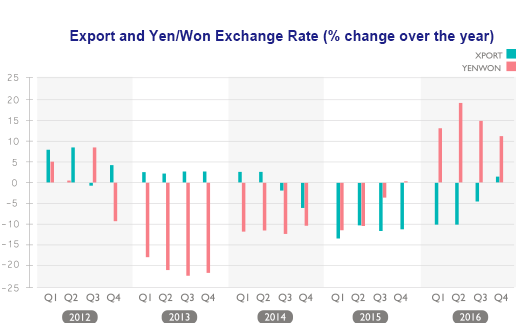
With the global economy showing signs of recovery,
Korea’s export volume has jumped over the last three months
After showing a prolonged lull
in growth rates, Korean
exports finally began recording
positive growth since
November 2016. The long streak of sagging
exports had stopped and a spike in
exports continued for three consecutive
months. Though the recent export volume
is slightly lower than what it used to be a
couple of years back, the jump in exports
for more than three consecutive months is
encouraging news to the Korean economy.
Before making judgments about
future export performances, however, it is
important to figure out what factors have
contributed to the recent improvements.
The major factor behind this export
turn-around is the exchange rate—especially
the yen/won rate. From mid-2015
and onward, the yen/won rate began to
surge from about 9 won per yen to 11.3
won by the middle of 2016, which is
about 25 percent the yen appreciation rate
against the won. This appreciation
implies Korean exports have become
more price competitive compared to its
Japanese counterparts. As seen in the
graph below, the movement of the
yen/won exchange rate is closely related
to Korean export growth. For example,
the yen/won exchange rate began to fall
for 12 quarters since Q4 of 2012 until Q3
of 2015, and this period of the depreciating
yen matches exactly with the period
of declining exports from Q3 of 2014 to
Q3 of 2016. Judging from the structural
relationship between the exchange rate
and Korea’s trade, strong export growth
will continue this year.
Another major factor is the general
improvement in the global economy. As
the IMF forecasts suggested this January,
the world economic outlook this year
seems to be better than last year. The
global economy is expected to grow 3.4
percent this year as opposed to 3.1 percent
in 2016. The United States is expected
to grow to 2.3

percent this year, compared 1.6 percent last year. Emerging market economies are expected to grow 4.6 percent this year, which is a significant
improvement from 4.2 percent in
2016. On this note, circumstances are
expected to improve throughout the
world. If this is the case, then global
exports will expand significantly and
Korea should be going down the right
path.
Of course there are some challenges
ahead. First, the U.S. Department of
Treasury will decide on its watch list
countries this April, and political and
financial tensions could erupt. Second,
the Federal Reserve is expected to raise
the federal funds rate and this would
cause the global interest rate to increase,
which would discourage spending and
investments. Third, the seemingly protectionist
policy of the Trump administration,
especially the border adjustment tax
(BAT), or the re-examination of NAFTA
and/or existing multilateral trade frameworks
such as WTO might have a dampening
effect on global trade. But free and
fair trade is what the Trump administration
really cherishes and global trade
should eventually flourish as long as the
notion of fair and free trade is kept intact.
Fourth, how fast the Chinese economy
will recover from its sluggish growth, and
how the UK can continue smooth negotiations with EU are issues that still remain up in the air.
Despite all the uncertainties
and risks, it is strongly believed that this
year seems to be better than the last one.
No matter what the decision of the
Constitutional Court, sooner or later
Korea is going to have a new president
and new leadership this year.
In order to accelerate export performances,
Korea should fully utilize opportunities
arising from the Trump administration’s
investment in infrastructure. When
it comes to the construction of dams,
bridges, canals, pipelines, railroads and
highways, Korean companies have been
one of the most efficient in the field. Also
Korea should continue to maintain its
strong FTA network with the United States. Minor
adjustments to it may be inevitable but
the complete scraping of the agreement is
unthinkable because the agreement centers
heavily on mutual benefits for both
countries.